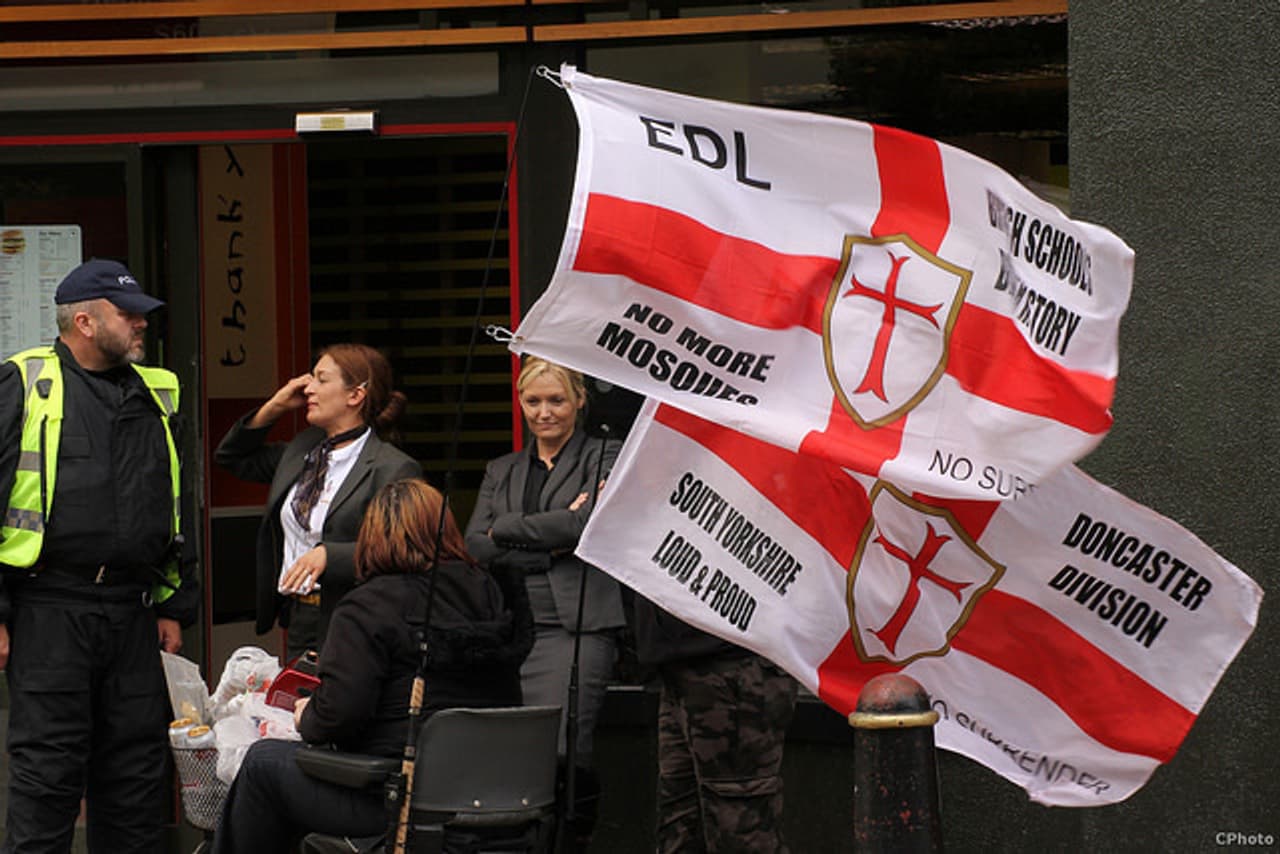
Preventing far right extremism? Schools in EDL and BNP heartland only monitoring ethnic minority pupils
EDL supporters from South Yorkshire at a demo in Rotherham, near Barnsley, 2014, by Chris/Flickr
Schools in an area with a history of far-right activism have been singling out black and ethnic minority pupils in monitoring for signs of radicalisation – while suggesting white children are not at risk due to their skin colour.
The three schools, in Barnsley, South Yorkshire, have published adapted versions of the same “Radicalisation and Extremism Risk Assessment” document on their websites.
The document relates to the government’s Prevent counter-extremism strategy, which requires schools to protect children from being drawn into all strands of radicalised ideas, including from the far-right.
Each of the schools’ assessments say that white pupils are at low risk of radicalisation on account of their skin colour and because many families have links to the Armed Forces.
This is despite a relatively recent history of far-right activity in Barnsley, where the English Defence League and the British National Party have traditionally enjoyed strong support.
The Bureau discovered the documents while examining how widely the non-Muslim aspects of Prevent are being applied in schools and local authorities where there has previously been far right activity.
When Prevent was first launched by the Labour government in 2007 it focused on preventing Al-Qaeda-linked terrorism. The programme was criticised for damaging relationships with Muslim communities – who perceived they were being spied on – while failing to deal with far-right violence.
The policy was specifically expanded to include far right extremism in 2009, a move re-emphasised by the Coalition in 2011.
Because there is no requirement by the Department for Education for schools to publish any risk assessments carried out for Prevent, information is scarce.
The three schools identified by the Bureau published their assessments voluntarily and in good faith; all three came from the same area of Barnsley in South Yorkshire; and all three used a template approved by the Prevent team at South Yorkshire Police.
The schools are: Holy Trinity, which is a Catholic and Church of England school for pupils age three to 16; Dearne Advanced Learning Centre, a specialist humanities college which takes children aged 11 to 16; and Springwell Learning Community, which runs two schools providing special and alternative education for children aged five to 17.
After being contacted by the Bureau, one of the schools said it would amend the wording of the assessment, while a second said it “may be reviewed”. A third headmaster declined to discuss the matter.
BME cohort is monitored
The documents have several sections that school officials are asked to complete.
In one sections that asks, “Is the school particularly prone to radicalisation and extremism,” each of the three schools replied: “No. Cohort of pupils are white British majority.”
In a section evaluating the risk of radicalisation for pupils, the schools stated “None” and “low risk”, adding: “Several pupils are connected to the local armed force cadet clubs and take a keen interest in British military work.”
And in completing that section, the schools then add: “Staff continue to monitor BME [black and ethnic minority] cohort.”
In a section that asks about the risk associated with the community, the schools said there was “low risk”, adding: “The local community which the school serves consists predominantly of white British families. The community is mainly an ex-mining community with high numbers of unemployment. Many members of the community have ties to Armed Forces through current or past family members.”
The National Union of Teachers is concerned by the language used in these documents.
It is not known how widespread such language is in UK education because not all schools use and publish these risk assessments.
However, after being contacted by the Bureau, Simon Barber, headteacher at Holy Trinity, said the policy had been uploaded in error. He said: “I do not agree with the language used on the policy you saw and we are now in the process of putting the right one in place.
“The imperative on schools to have such policies is still a relatively new requirement and many, like us, are still finding their way with them. I do think they are important and necessary given the way world politics seems to be moving. I am pleased to say that BNP support appears to have peaked and the most recent council elections saw a decline in their support. We nevertheless need to remain vigilant against far right extremism.”
David Whitaker, principal of Springwell Learning Community, said any suggestion that the document had racist connotations was a misinterpretation. He said: “Because of your interpretation of the policy, it may need to be reviewed but I am confident that the school takes its responsibility at all levels very seriously and would never be complacent when making assessments of risk to our pupils.
“We fully accept that we need to be vigilant in the current climate and this applies to both extremes of radicalisation. I also accept that the comment about the cohort being mainly white British does imply that that is the only reason for the low risk assessment. However, we do take the tackling of racism very seriously indeed. We have real rigour in the way we cover this in school.”
Mark Allen, vice-principal of the Dearne ALC, said: “We try to ensure we follow and implement policy in our everyday work, this being one aspect of this. However, as a school we don’t involve press agencies within our work.” He declined to comment further.
Ofsted inspection
Education watchdog Ofsted inspected one of the schools, Dearne ALC, after the risk assessments were published online but it declined to comment on whether the language used was appropriate. It is looking into whether its inspectors saw the document during the school inspection.
Barnsley Council refused to comment, despite repeated requests from the Bureau, on whether it was appropriate for local schools to single out black and ethnic minority students for monitoring.
A council spokesman said: “Barnsley is proud of its balanced and inclusive community relations, and active partnership working takes place to promote inclusion and equal rights. The council, police and partners will act quickly and decisively if they are notified of any extremist behaviour, whether right- or left-wing in nature.”
Alex Kenny, executive member of the National Union of Teachers (NUT), said he was concerned the Government’s Prevent policy was being misinterpreted by some schools so that they were only “targeting and profiling of Muslim students as opposed to any other group”.
This is despite the fact that some groups of students are clearly more at risk of being drawn into far right extremism, he added.
“I think it is very easy for schools to take a wrong or mistaken approach to this matter in response to the messages they are getting from government – and this could lead to damaging consequences.”
For example, he said, teachers are being told that opposition to Western intervention in the Middle East is an indicator that a student may be at risk of radicalisation.
“Schools are being left to interpret what the government means by this and it is not surprising that these schools [in Barnsley] have come to the conclusions they have.”


